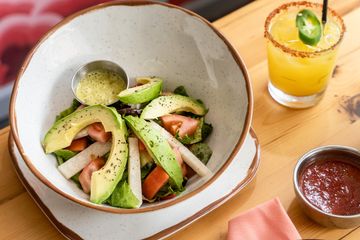Is Mexican Food Healthy? Unloading the Nutritional Conveniences of Typical Ingredients
The concern of whether Mexican food is healthy and balanced invites an exploration of its standard active ingredients. Beans and corn act as foundational staples, abundant in healthy protein and fiber. Avocados provide useful fats, while numerous natural herbs and spices add flavor and wellness advantages - freshly made guacamole. Together, these elements produce a tapestry of nutrition. The healthfulness of Mexican food frequently depends on preparation techniques and part sizes. What function do these elements play in identifying its general dietary value?
The Power of Beans: Protein and Fiber-Rich Staples
Although typically neglected, beans serve as a foundation of Mexican cuisine, offering a riches of dietary benefits. Rich in protein, they are an excellent plant-based alternative for those seeking to meet their dietary protein needs. This high protein content supports muscle repair and development, making beans indispensable for both vegetarians and meat-eaters alike. Furthermore, beans are an extraordinary source of nutritional fiber, which helps in digestion and advertises a sensation of fullness, possibly assisting with weight management.
The selection of beans utilized in Mexican dishes, such as black beans, pinto beans, and kidney beans, adds to a diverse flavor account and can boost dishes nutritionally. Beans are low in fat and contain crucial vitamins and minerals, including iron, folate, and magnesium. With each other, these characteristics make beans a crucial component, supplying both nutrition and sustenance in standard Mexican price.
Corn: a Versatile Grain With Nutritional Perks
Corn attracts attention as a versatile grain essential to Mexican food, commemorated not just for its cooking applications yet additionally for its impressive nutritional profile. As a primary component in meals like tortillas, tamales, and pozole, corn supplies necessary nutrients that add to a well balanced diet plan. Rich in carbohydrates, it acts as a considerable power resource, while likewise being low in fat, making it a positive choice for different nutritional needs.
Corn is an excellent resource of nutritional fiber, which helps in food digestion and promotes satiety. It contains significant quantities of vitamins such as B-complex vitamins, which are essential for basal metabolism. The visibility of anti-oxidants, especially carotenoids, adds to total wellness by lowering oxidative anxiety. Furthermore, corn is gluten-free, catering to those with gluten level of sensitivities. On the whole, the dietary benefits of corn emphasize its value in conventional Mexican food and its role in a healthy and balanced diet plan.
Avocados: Healthy Fats and Nutrients in Every Bite
Avocados play a substantial role in Mexican cuisine, enhancing dishes with their velvety texture and abundant taste. Beyond their cooking charm, avocados are celebrated for their impressive dietary profile. They are a rich resource of healthy monounsaturated fats, which can aid reduced bad cholesterol degrees and support heart health. Furthermore, avocados are packed with necessary minerals and vitamins, consisting of potassium, vitamin E, and B vitamins, contributing to total wellness.
The high fiber web content in avocados aids food digestion and promotes satiation, making them an advantageous enhancement to any dish. Their unique nutrient make-up can also sustain skin health and offer anti-inflammatory advantages. Incorporating avocados right into traditional Mexican meals or appreciating them as a standalone snack can improve both taste and nutrition, demonstrating why they are a precious staple in Mexican cuisine. In general, avocados supply a delicious method to appreciate healthy fats and vital nutrients in every bite.

Seasonings and Natural Herbs: Flavorful Health Boosters
While delighting in the rich flavors of Mexican cuisine, one can not neglect the vital function that spices and herbs play in improving both taste and health. Ingredients such as cilantro, oregano, and chili peppers not only add to the vivid taste account however also offer significant health advantages. Cilantro is recognized for its purifying homes, assisting to eliminate hefty metals from the body, while oregano is packed with anti-oxidants and possesses anti-inflammatory effects.
Chili peppers, a staple in several Mexican meals, consist of capsaicin, which has actually been linked to boosted metabolism and discomfort relief. Furthermore, seasonings like cumin and coriander support digestion and may help in blood glucose law. Incorporating these delicious health and wellness boosters right into meals not only boosts the cooking experience however likewise advertises general well-being, making Mexican food not simply scrumptious, but also nutritionally helpful.
Traditional Cooking Methods: Enhancing Nutrition and Taste
Conventional food preparation techniques in Mexican food play an important role in New York Times rated boosting both nourishment and flavor, as they frequently focus on time-honored strategies and fresh active ingredients. Methods such as nixtamalization, where corn is saturated and prepared in an alkaline option, not just improve the nutrient profile of tortillas but likewise enhance their digestibility - best mexican westchester NY. Additionally, using sluggish cooking techniques, like stewing or braising, allows flavors to combine magnificently while retaining the honesty of the active ingredients

Frequently Asked Inquiries
Are Mexican Food Portions Usually Larger Than Other Foods?
Mexican food sections are often bigger than those of several various other foods. This particular reflects conventional eating techniques, highlighting communal sharing and hearty meals, which can lead to an extra considerable offering size generally.
Just how Does the Preparation Approach Affect Healthfulness of Mexican Food?
Preparation techniques considerably influence the healthiness of Mexican food. Methods such as cooking or steaming maintain nutrients, while frying can raise unhealthy fat web content. Options of ingredients and cooking designs inevitably figure out general dietary value.
Can Mexican Food Be Customized for Particular Nutritional Constraints?
Mexican food can without a doubt be tailored for specific nutritional constraints. Alternatives, such as utilizing corn tortillas for gluten-free diet plans or including more veggies, allow people to delight in standard flavors while suiting various nutritional requirements.
What Are Common Mistaken Beliefs Regarding Mexican Food and Health And Wellness?
Typical mistaken beliefs concerning Mexican food include the belief that it is inherently harmful, overly hot, and exclusively focused on fats. In fact, traditional meals often include healthy ingredients and can be customized to numerous dietary needs.
Are There Much Healthier Choices at Mexican Restaurants?
Much healthier alternatives at Mexican dining establishments often include smoked meats, beans, and fresh vegetables. Picking dishes that stress entire ingredients and preventing heavy sauces can result in a more healthy dining experience, promoting overall health.
The variety of beans used in Mexican meals, such as black beans, pinto beans, and kidney beans, contributes to a diverse taste profile and can enhance dishes nutritionally. Avocados play a significant duty in Mexican food, matching meals with their velvety texture and abundant taste. Including avocados right into typical Mexican recipes or enjoying them as a standalone treat can improve both flavor and nourishment, showing why they are a beloved staple in Mexican food. While taking pleasure in the rich flavors of Mexican food, one can not overlook the important role that spices and natural herbs play in improving both taste and wellness. Typical cooking techniques in Mexican food play an important duty in enhancing both nourishment and flavor, as they commonly prioritize fresh active ingredients and time-honored techniques.